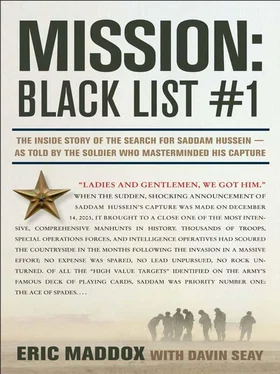That’s not to say I hadn’t received the best training available at the time, maybe the best in the world. In 1999 I had attended an eight-week interrogation course at the U.S. Army Intelligence Center in Fort Huachuca, Arizona. There I was taught military doctrines from Field Manual 34-52, on how to conduct effective interrogations in conformity with U.S. and international laws. I learned how to avoid getting simple yes-or-no responses by asking interrogative questions: who, what, when, where, why, what else, and what other. I was instructed in psychological approaches like Pride & Ego Up, which was meant to build up a prisoner; and Pride & Ego Down, which was meant to tear him down. I was introduced to the Geneva Convention rules prohibiting physical or mental duress, torture, or other forms of coercion to secure information.
What I didn’t learn was how to actually get the job done. Most of my instructors had never interrogated a real live prisoner. There had been very few prisoners since Vietnam. The means and methods I was taught assumed I would be in a battlefield environment much like that war, or even World War II. There was no preparation for modern urban combat, where the enemy is everywhere and nowhere at the same time. I would soon find out I was going to need to start from scratch.
But as much as I had to learn, I also had innate abilities I brought to the mission. Like anyone else, I’m really smart at some things and really dumb at others. It just happens that the things I’m smart at were helpful to becoming a good interrogator. It’s a certain capacity I think I was born with.
In some ways my upbringing wasn’t that different from any other typical American kid. I was born in Enid, Oklahoma, and raised in the small town of Sapulpa, on the outskirts of Tulsa. I was active in my church youth group and grew up playing baseball and football. I’ve always loved sports especially football and even after shipping out to Iraq, I did my best to keep up with the incredible 2003–4 season the Oklahoma Sooners were having.
OU is my alma mater, where I joined a fraternity, partied hard, and tried to figure out what I wanted to do with the rest of my life. I had long since realized that, with my stature and weight—five feet nine inches and one hundred fifty-five pounds—my football career would come to a screeching halt after high school. I studied political science with some vague idea that I would go on to law school.
The fact was I had no idea what to do. After graduating, I would have the choice of staying on for a law degree or, like most white, middle-class males, I would go on to find an entry-level job in business, followed by a wife and kids and a membership at the local country club. But what I really wanted was to step out of my sheltered life for once. I needed to do something that I felt made a difference, at least in my world. I wanted to serve in the military. In the summer before my senior year I went to the U.S. Army recruiting office and signed up, postdating my enlistment date until after I graduated from OU.
Serving my country was my main goal, but I also had a close buddy who definitely motivated me. His name was Casey and we’d always had a friendly rivalry growing up in Sapulpa. Casey had joined the Army a year before I did. After that, our military careers tracked pretty closely, with Casey always being one step ahead of me. When I was in basic training, he was in Ranger School. Then, when I went to Ranger School, he went to Special Forces. It was only after he was in SF that our paths diverged. I would eventually become an interrogator and he went with his Special Forces team to Bosnia, where he was honored for saving hundreds of lives while stationed there.
It wasn’t that we were in competition. I wasn’t trying to catch up with him. I just looked up to him. We’d come from the same place and shared the same values. There was a bond between us that couldn’t be broken even when, in April 2003, Casey died of unknown causes in his sleep. A few months later I’d find myself in Iraq, carrying the memory of my friend with me. I got to where I’d talk to him out loud about the challenges I was facing and the disappointments I was dealing with. Eventually I was even able to picture him sitting at a bar, maybe in heaven. He’d be having a beer with my grandfathers, both of whom had served with distinction in World War II. More than anything, I wanted to earn a place at that bar.
My family was similar to those of most of my friends growing up in a small town in Oklahoma, except for the slight detail that my brother and I were adopted. I was only a few days old when they brought me home from the hospital, and in the years that followed, my parents never made a secret of the fact that I was adopted.
What they couldn’t provide was any information about my birth parents. Those records had all been sealed as part of the adoption procedures. But that didn’t stop me from being curious and eventually that curiosity got the better of me. We would regularly drive to Enid, Oklahoma, on family visits to see my grandparents and because I knew that was my birthplace, I would stare out the car window at the people passing on the street. Any one of them could have been my mom or dad. It wasn’t that I didn’t love my parents, or think of them as my own. More than anything, it was that the information about who I was and where I came from was being denied me. That just made me more determined to figure it out.
Maybe it was an early indication of my aptitude for interrogation. If there was something I wasn’t supposed to know, I couldn’t rest until I knew it. I can’t remember ever laughing harder than when the cop on The Simpsons asked his son, “What is your infatuation with the secret closet of mystery?”
Maybe it was just the natural curiosity of any adopted kid.
Either way, during the Labor Day break before my junior year of college, I went back to Enid on my own to see if I could crack the secret.
I was determined to find my birth mother and had brought enough money to stay in a hotel for three days. I figured the best place to start was the public library. I searched newspapers dated on and around my birth date, but to no avail. After a couple of hours of frustration, the kindly librarian took pity on me and steered me to the records section, where I sifted through all sorts of references—everything from phone books to yearbooks. Finally, in the court records of adoption cases, I found what I was looking for. The judge accidentally let my mother’s name—Webster—slip.
We returned to the yearbooks, looking for all female Websters until finally I came across a picture of a teenage girl who had a familiar look: Debbie Webster. When the librarian saw it, her eyes welled up. “Oh my God. That has to be her.”
I looked up the name in some old phonebooks and discovered that a Debbie Webster had lived in Enid at the home of Thelma Webster until 1972, the year I was born. A cross-check of a current directory showed that the address was still listed.
Now I had some soul searching to do. What was the point of this exercise? Was it to meet the mother who gave me up for adoption or was it just to prove I could find her? Either way, I had to play this out.
The Webster residence was a small, white house with a screened-in front porch. An elderly lady sat smoking a cigarette out front. She eyed me with suspicion. I was a college kid and looked the part, with brown Cole Haan loafers, white tube socks, and a Tommy Hilfiger shorts-and-shirt combination. If I saw that kid today, I’d throw an egg at him.
“Can I help you?” the lady on the porch asked me. I should have been more prepared. I hadn’t actually expected to find her, and up close I couldn’t see a resemblance. “Yes, hello…I’m, uh, looking for someone. Are you Thelma Webster?”
Читать дальше












